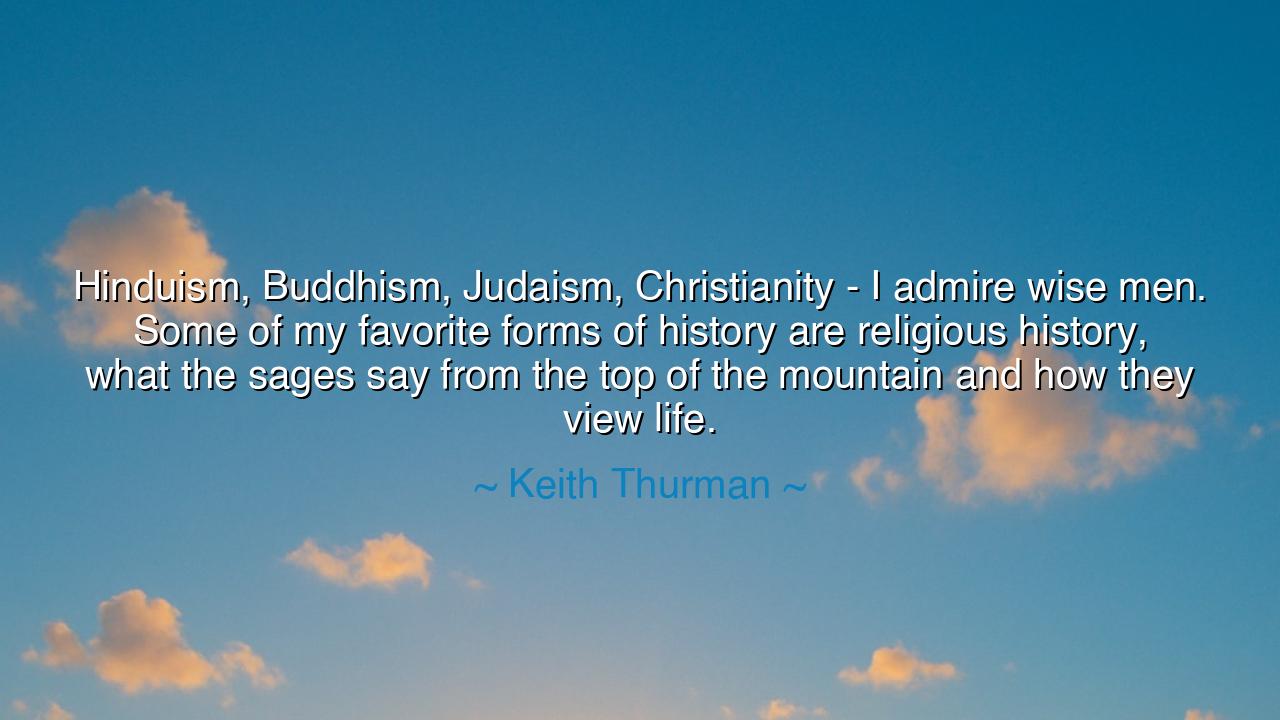
Hinduism, Buddhism, Judaism, Christianity - I admire wise men.
Hinduism, Buddhism, Judaism, Christianity - I admire wise men. Some of my favorite forms of history are religious history, what the sages say from the top of the mountain and how they view life.






“Hinduism, Buddhism, Judaism, Christianity — I admire wise men. Some of my favorite forms of history are religious history, what the sages say from the top of the mountain and how they view life.” — Keith Thurman
Thus spoke Keith Thurman, the warrior-philosopher of the modern ring, a man whose fists have tasted battle but whose mind has sought understanding. His words, though born in the arena of sport, reach far beyond it — into the quiet chambers of the human soul. For in them he declares not allegiance to one creed, but reverence for wisdom itself — for the teachings of those who, throughout the ages, have climbed the mountain of the spirit and looked down upon the valleys of human struggle. “I admire wise men,” he says, and in that simple statement lies a truth as old as civilization: that knowledge divides, but wisdom unites.
When Thurman speaks of Hinduism, Buddhism, Judaism, and Christianity, he calls upon four great rivers of human thought, flowing from distant lands and different times, yet all springing from the same eternal source — the longing to understand the meaning of life. From the Vedic sages who chanted beneath the Indian sun, to the Buddha who sat beneath the Bodhi tree, to Moses upon Sinai, and Christ upon the mount, each sought not wealth, not glory, but truth — that which cannot be seen by the eye, but only known by the awakened heart. In honoring them all, Thurman stands among those rare souls who see that the summit of one mountain touches the summit of all.
“What the sages say from the top of the mountain” — here, his words become poetry, rich with ancient imagery. For throughout history, mountains have been symbols of divine encounter and human ascent. They stand between earth and heaven, between the striving of man and the silence of eternity. When Moses received the law, it was on Mount Sinai; when the Buddha reached enlightenment, it was upon the heights of Bodh Gaya; when Christ delivered his sermon of peace, it was upon the Mount of Beatitudes. These sacred peaks remind us that wisdom is not found in the noise of the marketplace, but in the stillness above the clouds, where truth speaks softly to those who have endured the climb.
There is a story told of Laozi, the ancient Chinese sage who, weary of the corruption of his time, mounted his ox and rode westward into the mountains. There, at the edge of the known world, a gatekeeper begged him to write down his teachings before departing. And so, upon that threshold, Laozi composed the Tao Te Ching — a book of fewer than six thousand words that would outlast empires. It was not written in the halls of kings or the noise of cities, but at the border between the worldly and the eternal. Such is the pattern of wisdom: it arises when a soul dares to leave behind comfort and ascend toward truth.
Thurman, in his admiration for religious history, reminds us that to study the past is not merely to know what happened, but to hear the voices of those who once gazed upon the mystery of existence. History, when viewed through the eyes of faith and philosophy, is not a record of wars and rulers, but a tapestry of revelation — a chronicle of humanity’s unending conversation with the divine. The “wise men” he honors are not just teachers of religion, but guardians of perspective. They teach us how to live when life feels unbearable, how to forgive when the heart is wounded, how to hope when the world grows dark.
In this way, Thurman’s words are not the boast of a fighter, but the confession of a seeker. He has faced his opponents in the ring, but he has also faced himself — and found that the greater battle lies not in the body, but in the mind and soul. The wisdom of the sages, he seems to say, is the true victory: the power to stand still in chaos, to see clearly amid confusion, to love amid conflict. It is this spiritual discipline, older and harder than any sport, that he reveres.
So, O children of the present age, take this lesson to heart: seek wisdom wherever it may be found. Do not ask whether it comes from East or West, from scripture or silence, from temple or wilderness. The truth wears many robes, but it is one spirit. Listen to the voices that call from the mountaintops — the Buddha’s calm, the Christ’s compassion, the rabbi’s law, the yogi’s union. Let them shape your heart into something vast and kind. For to honor the sages is to join them, to lift your eyes from the dust of the road to the heights of eternity, and to remember that life’s greatest triumph is not victory over others — but understanding of oneself.
Thus, as Keith Thurman reminds us, the true champion is not the one crowned in the ring, but the one who, like the wise men of old, ascends the mountain of the spirit — and returns not with pride, but with peace.






AAdministratorAdministrator
Welcome, honored guests. Please leave a comment, we will respond soon